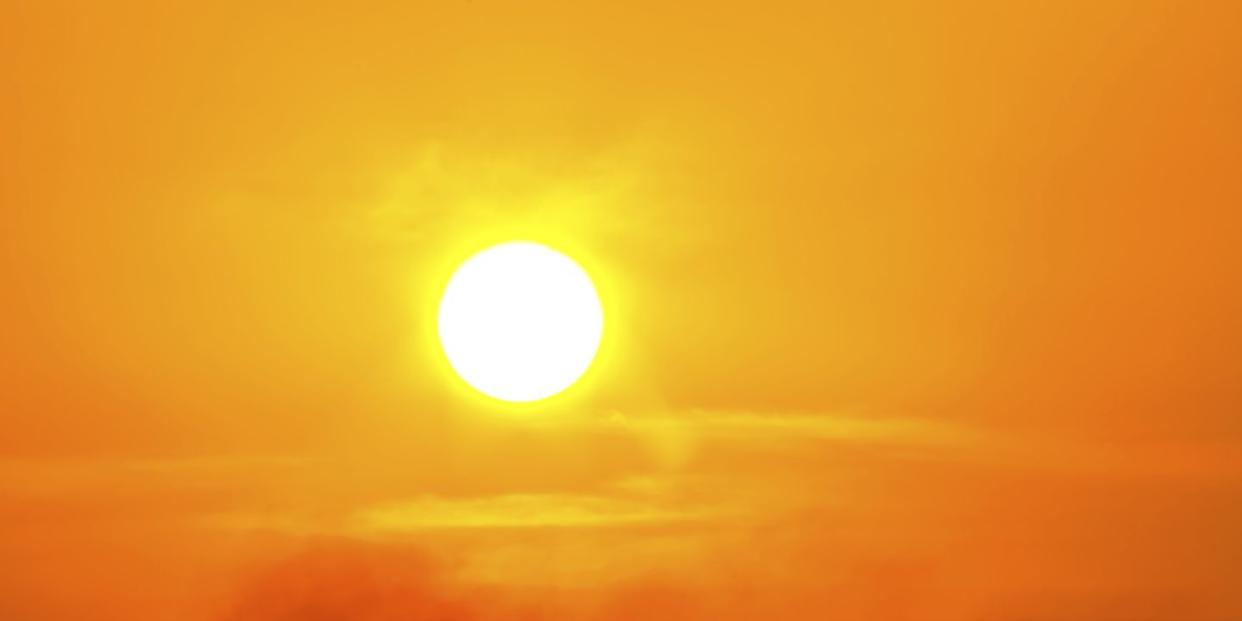There’s a Historic Heat Wave Happening Right Now

The National Weather Service is warning about a “dangerous and record-breaking heat wave” that will impact most parts of the Great Plains and Mississippi Valley, as high temperatures continue across many areas of the southwestern U.S. Nearly 35 million people are under excessive heat warnings or heat advisories, the agency says, noting that the “oppressive heat” is expected to continue.
There are also high temperatures expected in many parts of the east coast this week. The National Weather Service shared on Twitter that heat-related advisories and warnings are “likely throughout the week.”
7/17/22 - Excessive heat will continue this week across parts of Southern Region. Heat advisories and excessive heat warnings are in effect today across TX/OK. Additional heat-related advisories and warnings are likely throughout the week. pic.twitter.com/P5acSaPFYE
— NWS Southern Region (@NWSSouthern) July 17, 2022
Temperatures are currently soaring in Europe, too, including in the U.K., where the thermostat is predicted to reach 104 degrees on Monday.
If you live in an area that’s under a heat warning or facing high temperatures, it’s understandable to have questions about why what’s been dubbed the Historic Heat Wave of 2022 is such a big deal and how to stay safe. Here’s what you need to know.
What is a heat wave, again?
A heat wave is a period of unusually hot weather that usually lasts two or more days, according to the National Oceanic and Atmospheric Administration (NOAA). In order for something to be considered a heat wave, temperatures need to be outside the historical averages for an area.
Heat waves usually happen because of trapped air that gets warmed like air inside an oven, NOAA explains. High-pressure systems force air downward, preventing air near the ground from rising and hot air just gets hotter.
Why can heat waves be dangerous?
Heat waves can cause heat illnesses, which include heat cramps, heat exhaustion, and heat stroke, according to the Centers for Disease Control and Prevention (CDC). Symptoms of those illnesses can include:
A body temperature of 103°F or higher
Hot, red, dry, or damp skin
A fast pulse
Dizziness or confusion
Nausea or vomiting
Passing out
Muscle cramps or weakness
Heavy sweating
Heat illness can be incredibly serious, says Lewis Nelson, M.D., chair of emergency medicine at Rutgers New Jersey Medical School. “As our body temperature rises due to persistence in a hot environment, our vital body functions, such as enzymes and organs, begin to malfunction,” he says. “This leads to organ failure, and if untreated, can be lethal.”
While everyone is at risk for heat illness, some are more vulnerable than others, says Nicholas Kman, M.D., emergency medicine physician at The Ohio State University Wexner Medical Center. "Those at greatest risk for heat-related illness include infants and children up to four years of age, people 65 years of age and older, people who are overweight, and people who are ill or on certain medications." There’s also “greater risk with greater exposure,” he says. Meaning, if you're going to be outside in high heat—and especially if you're going to be active while doing it—you're more likely to get sick.
How to stay safe in a heat wave
If you have time to prepare for a heat wave, the Department of Homeland Security (DHS) recommends taking a few steps to minimize the odds you’ll have issues when temperatures soar:
Add insulation and weather-stripping to points of entry in your home
Cover windows with drapes or shades
Use attic fans to clear hot air
Install window air conditioners
Get plenty of fans if you don’t have central AC
And, if the heat has already hit, the Red Cross has a laundry list of suggestions for how to stay cool. Those include:
Stay in an air-conditioned place as much as possible.
Wear lightweight, light-colored, and loose-fitting clothing.
Don't use an electric fan when the indoor air temperature is over 95°F. (Fan use can cause your body to gain heat instead of losing it.)
Take a cool shower or bath to cool your body.
Shut out the sun and heat with curtains.
Use your stove and oven less.
Try to limit your outdoor activity to when it’s coolest, like morning and evening hours.
Rest often in shady areas so that your body has a chance to recover.
Cut down on exercise during the heat.
Protect yourself from the sun when you’re outside by wearing a wide-brimmed hat, sunglasses, and sunscreen that says "broad spectrum" or "UVA/UVB protection."
Dr. Nelson also recommends carrying water with you. “Maintaining adequate hydration is important, but it is equally important not to overdo it,” he says. “When we sweat, we lose salt and water, and if we only drink water without electrolytes, we run the risk of lowering our body sodium to concerning levels.” That’s why he suggests “eating regularly, along with drinking water or drinking electrolyte-containing beverages” like sports drinks.
Overall, Dr. Nelson says “keeping cool and safely hydrated is most important.” And, if you need to be outside in high heat, he recommends keeping tabs on how you feel and heading into cooler temperatures if you start to feel off.
You Might Also Like

